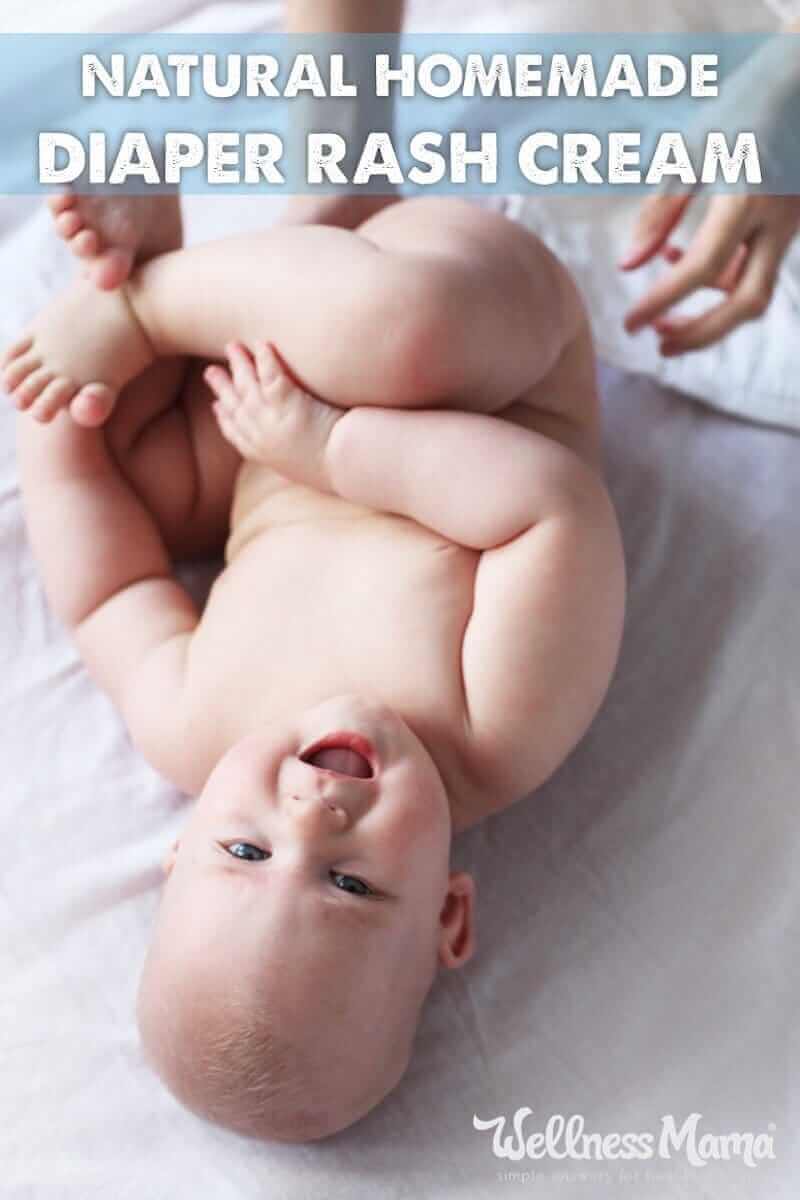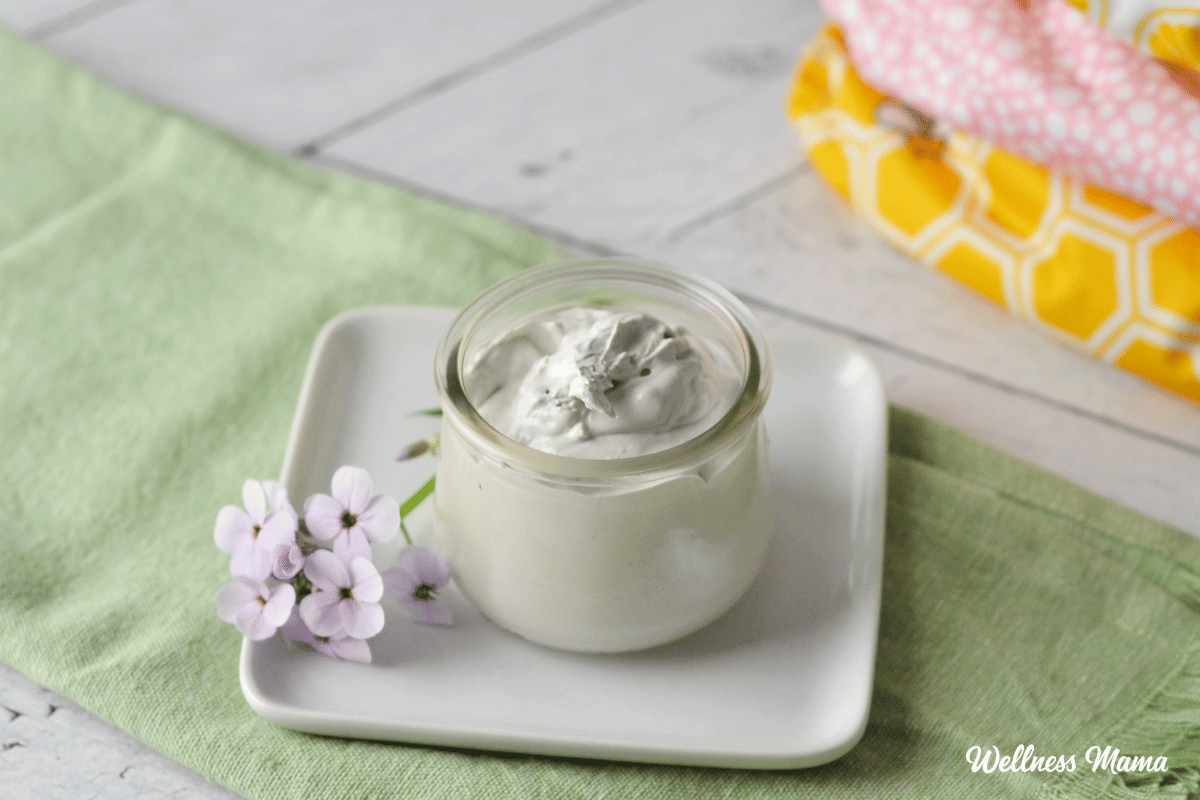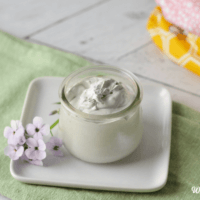I’ve shared my homemade baby care recipes before but I get a lot of questions about natural diaper rash cream variations. After playing around with some recipes I’ve found one that’s far more effective! This homemade diaper rash cream is gentle and nourishing on baby’s skin.
How to Make a Natural Diaper Rash Cream
I chose all the ingredients in this homemade diaper rash cream recipe for a very specific reason. Together they’re really effective at battling baby’s diaper rash. They’re great for little ones with sensitive skin to protect baby’s bum against irritations. And if they do end up with a rash it helps to clear it up quickly.
For this recipe, I use:
- Shea butter – This is one of the core ingredients in DIY diaper rash cream because it has vitamins A and E. It soothes skin and protects it from drying out thanks to its essential fatty acids.
- Coconut oil – I use coconut oil for most things, but it’s especially helpful for diaper changes. It’s a mild natural antibacterial and anti-fungal. Coconut oil is pretty effective on many types of diaper rash if used alone but it’s even better with other ingredients. Coconut oil has antimicrobial properties but can cause allergies for some. If you notice any skin irritation with coconut oil, then extra virgin olive oil is a good substitute. Just increase the beeswax some in the recipe to maintain the same consistency.
- Beeswax – This provides a protective barrier on the skin. It also helps to thicken and hold the other ingredients to the skin so they can be effective.
- Cod Liver Oil – A secret ingredient for helping heal baby’s bottom. Fish oil is often used in store-bought diaper creams but I prefer cod liver oil. This ingredient is optional but helpful.
- Bentonite Clay – Helps control moisture and fights bacteria on the skin that can make the rash worse.
Zinc Oxide
This is the final ingredient in my homemade diaper rash cream. Used in popular store brands like Desitin, zinc oxide repels wetness and coats the skin. When mixed with the other ingredients, it makes skin waterproof and keeps it from drying out.
Be sure to use non-nano zinc oxide since it’s less likely to absorb into the skin. This is also the main ingredient in my homemade sunscreen.
Want to Buy It?
Not in the mood to DIY or don’t have the time? Here are a few cloth diaper safe, natural diaper rash creams you can buy online.
Cloth Diaper Safe Diaper Rash Cream
If you use cloth diapers then zinc oxide can stain them. The zinc won’t contribute to a leaky diaper, but if you’d rather not have potential stains then you can omit it from the recipe. The diaper cream will be a little less creamy and thinner this way.
The only other ingredient that’s known to be unsafe for cloth diapers is petroleum. Found in products like Vaseline it creates a waterproof layer on the cloth and causes leaks. Thankfully you won’t find any petroleum in this recipe!
This recipe can be safely used as is with cloth diapers, but if you want to avoid stains then omit the zinc.
Herbs and Essential Oils
Adding soothing herbs to this recipe can make it even better for baby’s skin. If you want you can first infuse the coconut oil with herbs like calendula, plantain, and/or lavender. Here are instructions for how to make a solar infused herbal oil.
I also like to add a few drops of essential oils to my diaper rash cream. Only use baby-safe essential oils and be sure to properly dilute first! Chamomile essential oil, tea tree essential oil, and lavender essential oil are all good options. They’re generally considered safe to use at a .25% dilution on infants 4 months and older. This translates to about 1-2 drops for every 2 Tablespoons of carrier oil.
Yeast Rash
We naturally have bacteria and yeast in our gut, but sometimes they can get out of balance. Babies especially have immature immune systems and are prone to yeast infections that cause diaper rashes. According to the Cleveland Clinic, some signs include:
- Deep red or purple skin patches
- A shiny rash
- Fluid-filled bumps
- Cracked, dry skin
- Itchy, mildly painful skin
Antifungal ingredients, like tea tree oil, are a great way to fight a yeast diaper rash. It’s also important to change baby more frequently to keep the area dry. And if you’re breastfeeding you may notice thrush (candida overgrowth) on your nipples too.
Homemade Diaper Rash Cream Recipe
Equipment
- 8 ounce glass jar (or metal tins)
Materials
- ¼ cup shea butter
- ¼ cup coconut oil
- 1 TBSP beeswax pellets
- 1 TBSP cod liver oil (optional)
- 2 TBSP zinc oxide
- 1 TBSP bentonite clay
- 6 drops essential oils (optional, baby safe ones like lavender, chamomile, or tea tree)
Instructions
- Mix shea butter, coconut oil, and beeswax in a double boiler or glass bowl over a small saucepan with some water. Bring the water to a boil.
- Stir occasionally until everything is melted.
- Remove from heat and whisk in the cod liver oil, zinc oxide, bentonite clay, and essential oil (if using).
- Stir carefully as it starts to cool. I recommend using a popsicle stick or disposable straw to stir so it can be discarded since it is difficult to get the mixture off of dishes.
- Pour the diaper rash cream into your heat-safe container and stir a few more times as it cools.
- Store in an airtight container like a glass jar in a cool, dry place for up to 3 months. This will last up to 1 year if the cod liver oil is omitted.
- Use as needed for diaper rash or for prevention.
Notes
Another easy option is simply using breastmilk! Some studies show breastmilk helps naturally treat infant rashes and eczema even better than a steroid cream.
More Baby Skincare Recipes
Want some more natural baby care recipes? With 6 kids I’ve come up with quite a few baby recipes over the years!
- Baby lotion
- Baby wipes
- Baby powder (with arrowroot powder or organic corn starch)
- Gentle foaming baby wash
Have you ever made a homemade diaper cream? How did it work? Share below!




Leave a Reply